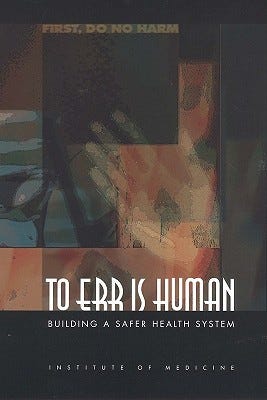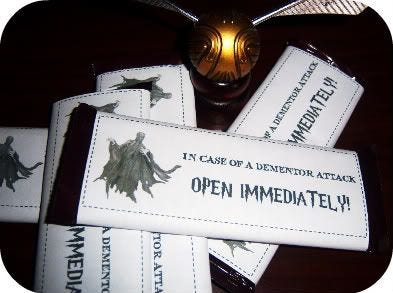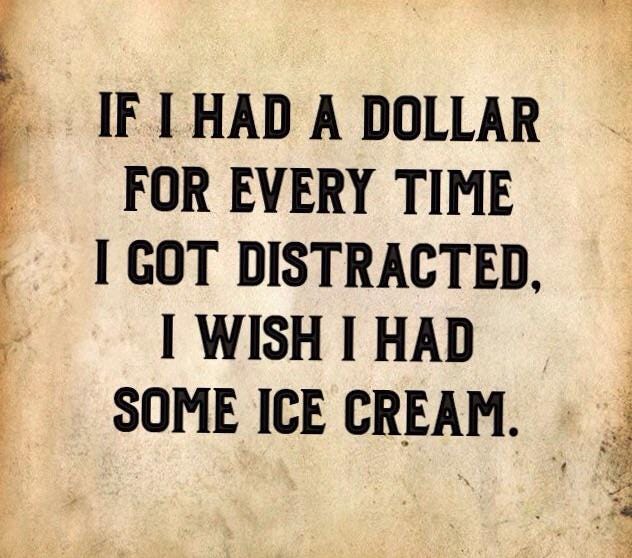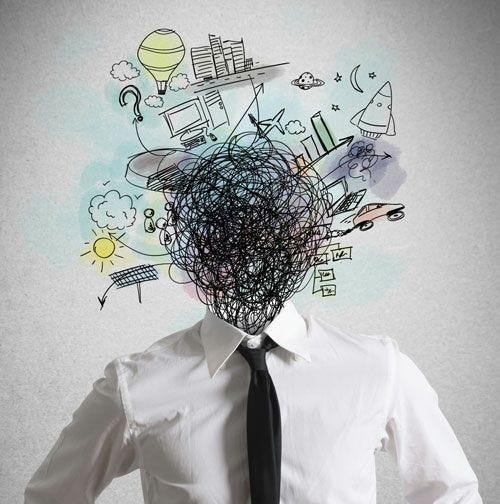I work in healthcare and in 1999, the Institutes of Medicine published a searing report about the lack of patient safety in healthcare. We apparently were accidentally harming people, resulting in many more preventable deaths than anyone knew. The proposed solution was to build “safe practices” that put patient safety at the heart of what we do. To build into our system a bias towards safety.
Working in our healthcare system I can say the problem is our brains have to remember to remember while under time pressure. I have to recall with accuracy the plans, the work up, the dosing, and the possible side effects of medications with maybe 5-10 minutes at most to think before I get interrupted. Anyone in this setting will naturally make mistakes.
I’ve had my share of mistakes or near misses as a doctor. It makes you humble. To be fair I’ve also had many wins. I go into each and every shift knowing I need to bring my best focus, which is a challenge in and of itself (ER Docs tolerate boredom poorly). I cannot help but see the parallels to chess. While the game of chess is no where near the same stakes, those of us who have taken up the game sometimes feel like it is.
Recently I had a game that was decided by such a horrible blunder I spent nearly a full 24 hours on tilt. I was so upset over what I had done that I wanted to take a break from chess. Clearly I wasn’t getting things right. My wife and I have a saying though. We get 24 hours to be upset or sad, but the next day we have to decide what we’re going to do about it. That’s where IM Jeremy Silman came in.
I own his book The Complete Book of Chess Strategy and often use it to review the basic ideas of openings while prepping for a game. The very next day after my blunder I had another game to play. I decided to hop back on the horse that had just kicked me off and try again. As fate would have it when I opened the book, somehow I went right to page 335, “Blunders”. He explained that not only do blunders happen, but they follow patterns. I couldn’t help notice some similar patterns to the IOM report.
The origin of blunders are (full credit to IM Silman here):
Exhaustion
Distraction
Loss of Concentration
Recurring patterns
Let’s hit each one.
Exhaustion happens. Every time we have to make a decision, our brain gets taxed a little. As more and more decisions pile up, we get tired. Whether I’m over the board or on a shift, I can only bring my best focus for so long. Once I get fatigued I suddenly have this intense craving for coffee and sugar. No one is able to stay focused and fresh for hours. Chess will make your brain burn calories faster than it wants. After periods of hard concentration, we need water and some snacks to refresh. We need a break.
I’ve noticed a pattern of blunders late in games that I suspect is due to this. It similar to when I'm on a shift. I can work for 3-4 hours all out but then I need to stop and regroup. With chess, it’s harder actually. I can sit over the board with good concentration for 1-2 hours tops. After that I need to regroup. After reading this section in Silman’s book, I decided that for every 1 hour over the board I’d plan a 5 min mental break (if possible) and some snacks.
It’s almost like chess is a dementor trying to suck the life out of your brain, and we need chocolate to feel better.
Distraction is a huge issue these days. We all carry devices with us and our attention has become monetized. Focusing on anything has become hard, especially in chess. But if you’re in the middle of a game and suddenly a phone goes off, that’s a distraction. In the Emergency Department, distractions are routine. Apparently our brains don’t like them and perform significantly worse after a distraction. People don’t really multi-task, they task switch. That is we put our focus on only one thing at a time, but we switch where that focus is frequently. Attention apparently is not a pie that can be divided equally, but rather it is just like us - we are greater than the sum of our parts. Divided attention is much worse attention, and there a clear cost to your performance in your job or over the board. Singular focus, otherwise known as flow state, is much better.
All we can do is understand distractions happen. Pause the game if you must, but at the very least take some time settle, refocus, and then start again with the position on the board. If you’re playing at home, try to turn off all the possible sources of distraction (alerts, notifications, other open windows) and keep your focus on chess. It will reduce your blunders.
Loss of concentration is very human. Some people really struggle with it. If you’ve ever tried to meditate and calm your mind into bliss, you know who maddeningly busy that damn mind can be. Thoughts arise constantly and there isn’t really a way to stop them. However, concentration is a muscle that can be built up. Meditation is a great way to increase your ability to focus, but not the only way. Chess actually helps your focus too!
Our brains were built first to survive, and when we have basic need that survival brain takes over. Making sure those needs are met will help improve your concentration and focus.
Sleep - each day our brains need sleep to refresh themselves. Whenever I’m sleep deprived or tired on a shift I’m much more likely to make mistakes. Same thing for chess.
Hunger - The mental cost of chess is great, and our brains need calories to do it. Keep some snacks (and water) nearby when playing.
Stress - Humans perceive stress in almost all things they do. It’s ironic that I should get more stressed over the board than I do while treating patients but I do. When I play stressed I get the worst chess blindness. Often I need to breath and help remind myself, it’s just a game and it will be alright. After that, I can get my brain back.
Lastly, we have recurring patterns where we make the same mistakes repeatedly. When we’re making decisions in life (and in chess) we’re using most often our System One brain. This is the part of our brain the runs on pattern recognition and broad assumptions. It is built to keep us alive and get us through the challenge we face right now. System Two thinks about the future and the potential consequences, but at great metabolic cost. Most of our mistakes come because our brains greatly prefer to not think if they don’t have to. When we get to positions that look familiar, we will often play the same moves as we’ve done before based on System One pattern recognition.
For example in the London system the light squared bishop should be on e2 even though it’s restricted by the f3 Knight. It has more activity on d3 but will fall prey to a common trap after Black plays d5! gaining a tempo on the Bishop on f4 and then forking the Bishop and the Knight. Newer players might not understand that until they lose a few games this way.
The only way to learn about your patterns is to analyze your own games. Take ownership of your mistakes, learn the lesson, and move on. Yes a coach can really help and chess videos can point out common traps. However until the awareness of the mistake part of your System One, it won’t be automatic and you may fall prey to it again.
Blunders happen in all human endeavors, even to the best chess players. There are steps we can take to reduce them, but not eliminate them completely. The IOM report on mistakes in healthcare advocated making patient safety the priority. Let me suggest one simple way to blunder less - focus on safety first. Are your pieces safe? What captures does your opponent have? Are there any checks for your opponent? Making the habit of anticipating your opponents move will be your best defense against blunders (… that and chocolate).
Thanks for reading! Hope we can all blunder a little less. Leave a comment and let me know what you think?







This was my favorite of your posts Nick! I actually hadn't seen Silman's categorization if blunders, its quite helpful.
Nice read, thank you, Nick. Found your insights quite helpful for chess improvement, especially in preparation for chess events. However 😉 it should be "Black plays e5!" instead of d5! in the sentence: "It has more activity on d3 but will fall prey to a common trap after Black plays d5! gaining a tempo on the Bishop on f4 and then forking the Bishop and the Knight."
I've looked at your fateful game on Lichess. Painful blunder, indeed. Chess is blunderfest for sure. 😜
It happened to me many times, way too many. Losing the game in the opening by blundering checkmate in-one (!) was the worst blunder I ever made in a classical OTB game. It happened in the middle of a strong, invitation only, round-robin tournament. My opponent happily took a gift and went to win the event, just half a point ahead of me, because I bounced strongly after the disaster. I hate losing in chess. 😈